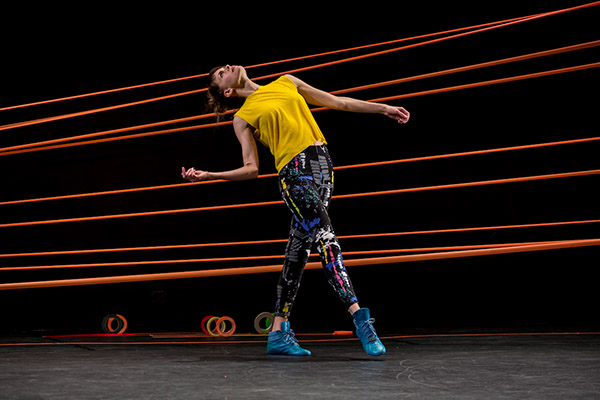Note: What follows below is an edited version of my remarks at the Inside Dance pre-performance talk ahead of Joanna Kotze’s “What Will We Be Like When We Get There.” Kotze and her cast perform this work tonight, Aug. 6, at the Stonington Opera House.
Throughout my time at the Bates Dance Festival, I’ve had the pleasure of facilitating a series of community conversations, as well as two pre-show talks. Artists tend to be most nervous about pre-show talks — they generally don’t want audiences to go in with preconceived notions about how to experience their work. If you happened to attend my talk before Doug Varone’s performance in the Schaeffer Theatre, you might recall I invited you to “bring yourself” to the performance and allow your personal stories to permeate your impressions of the work. In my conversations with Joanna, she was open about the process of creating “What Will We Be Like When We Get There,” but would prefer that we not spend time on what this show is “about.”
Instead, I’ve prepared some remarks about potlucks.
People tend to have strong opinions about potlucks. You either love them or hate them. Personally, I love them – even the ones where you don’t have to sign up for a dish to ensure all the food groups represented. I love potlucks comprised of four lasagnas and a chocolate cake. I love potlucks with a folding table full or unused plastic silverware, five varieties of chips and salsa, 12 cases of cheap beer, and those store-bought sugar cookies with a thick layer of icing.
When I’m invited to a potluck, I always bring deviled eggs – it’s kind of my thing – and no matter how many I make they always disappear before the last guest arrives.
Deviled eggs are a ridiculous appetizer, but also perfect in every way. They’re bite sized, contain an unreasonable helping of mayonnaise, and look much fancier then they actually are. The first few times I made deviled eggs I followed a recipe from the Betty Crocker cookbook, which is the gift every woman in my family receives when she first moves away from home.
Betty’s recipe is not that great, actually; it’s too salty and she definitely does not include enough mayonnaise. Over the years I’ve discovered a few ways to improve on Betty’s recipe, and now, I don’t follow a recipe. From experience, I know the perfect quantities of mayonnaise (read: a lot), salt and pepper, finely diced onion and paprika to add; I know that Dijon, pickles and celery don’t belong anywhere near my deviled eggs. God forbid you suggest using Miracle Whip.
Cooking in this controlled way is a solitary act, but I learned to cook with my Mom. Even as young kids my brother and I would stir ingredients or later learned to chop vegetables or made the side dishes. Some of those meals would have probably turned out better if she’d kicked us out of the kitchen, but working together to prepare a meal for our family was more important to her, and as a result, everything on our family table was delicious, because we’d made it together.
“What Will We Be Like When We Get There,” reminds me a little bit of those imperfect potlucks, and of those family meals prepared with my Mom. One of Joanna’s primary questions surrounding this work is, “How do we inhabit space together?” Four performers representing three genres of art – dance, music and visual art – get into the kitchen together with some shared goals and outcomes, and they don’t have a recipe to follow. Each brings a particular set of priorities into the space, and must spontaneously respond to the others. Continually, they must ask themselves what they’re willing to fight for, and what they’re willing to let go of.
We experience this process of compromise all the time, and not just in the kitchen. With your partner or children, among co-workers and collaborators, and even in the voting booth, we’re continuously faced with the need to pick our battles and prioritize the things that are most important to us. And by letting go of a little bit of control, we can benefit from the input and talents of others.
You might read in your festival brochure that Joanna began this process shortly after the 2016 election, but it’s not about that. Instead of looking for evidence of Donald Trump in the piece, consider how close the lines are between order and chaos, or humor and violence. Why do we laugh when the Three Stooges punch each other in the face? Why does a messy desk inhibit productivity and promote creativity? Political polarization has simultaneously created vitriolic tirades and gut-busting monologues – reality is sometimes so wholly ridiculous that we can’t help but laugh at ourselves, even as we are continually shocked and appalled.
So “What Will We Be Like When We Get There,” in a way, is an exercise in collaboration, in which each performer must hear and respond to others. In the process, the cast is making something, or building toward a “there.” What, where and then “there” is is less important than who we allow ourselves to become in the process.
In watching it, you might find chaos is actually necessary, and beautiful. You might find it inspires you to challenge your assumptions and expectations about others. You might unveil a desire to engage with others and reach beyond your personal and political echochambers.
And if you invite me to your potluck, you might discover I’ve brought lumpy deviled eggs stuffed with too-big chunks of celery in them and a bit too much paprika. They’ll still be delicious, and they’ll still be gone before the last guest arrives.
Lauren’s Deviled Eggs:
Ingredients
- Hard boiled eggs (as many as you want)
- Real mayonnaise (not Miracle Whip)
- Very finely diced onion (optional)
- Salt (or celery salt) and pepper
- Dried yellow mustard (not French’s)
- Paprika
Instructions
- Half each hard boiled egg, removing the yolks into a bowl and setting the whites aside on a platter. If you don’t have a deviled egg platter, you can strategically place lettuce or some other garnish around a platter to keep the eggs from toppling over.
- Using a fork, mash the yolks and add onion, if desired; salt and pepper to taste; and a small pinch of dried mustard. A little goes a long way.
- Add a big plop of mayonnaise to the bowl and blend with a fork or scrapper. Add enough to create a smooth, creamy consistency, but not so much that the mixture is just basically mayonnaise. Don’t bother getting your mixer dirty to whip the egg mixture unless you really need to impress someone and are making a large quantity of eggs.
- Transfer the egg mixture to a pastry bag (I often use a plastic baggie and cut a small tip off of the corner instead of using a piping bag), and fill the egg white cups with a nice mound of egg goo.
- Dust the tops with a dash of paprika. Scallion, bacon or lobster are tolerable garnishes, olives aren’t.


